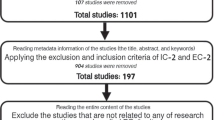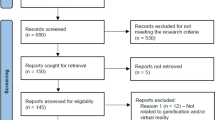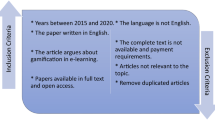Abstract
The COVID-19 pandemic has drawn the attention of educators to the blended learning model. This study developed a remote blended game-based learning activity that integrates digital game–based learning (DGBL) and blended learning (including online synchronous and asynchronous learning). This method emphasizes that in the online synchronous learning activity, students firstly use mini-educational digital games for group collaborative autonomous pre-learning and then take part in a problem-solving discussion activity guided by the teacher. Afterwards, students complete personal inquiry learning tasks in the asynchronous online activity and conduct asynchronous discussions. This study employed a quasi-experimental design. Participants were 73 senior high school students. The first group used the remote blended game-based learning that integrated DGBL into online synchronous learning. The second group used the face-to-face blended game-based learning approach that integrated DGBL into physical classroom learning. The third group used the remote blended video-based learning that integrated online synchronous video-based learning. The three groups conducted the same online asynchronous inquiry learning tasks. The results found that the remote blended game-based learning activity not only significantly promoted the students’ learning performance in online synchronous learning but also supported their learning performance in online asynchronous learning. Besides, most students’ discussion messages were mostly related to the learning tasks and topic.





Similar content being viewed by others
Data Availability
The data that support the findings of this study are available from the corresponding author, upon reasonable request.
References
Aguilera-Hermida, A. P. (2020). College students’ use and acceptance of emergency online learning due to COVID-19. International Journal of Educational Research Open, 1, 100011.
Alonso, G., & Schroeder, K. T. (2020). Applying active learning in a virtual classroom such as a molecular biology escape room. Biochemistry and Molecular Biology Education, 48(5), 514–515.
Andujar, A., & Nadif, F. Z. (2022). Evaluating an inclusive blended learning environment in EFL: A flipped approach. Computer Assisted Language Learning, 35(5–6), 1138–1167.
Baber, H. (2021). Social interaction and effectiveness of the online learning–A moderating role of maintaining social distance during the pandemic COVID-19. Asian Education and Development Studies, 11(1), 159–171.
Bado, N. (2022). Game-based learning pedagogy: A review of the literature. Interactive Learning Environments, 30(5), 936–948.
Bai, S., Hew, K. F., & Huang, B. (2020). Does gamification improve student learning outcome? Evidence from a meta-analysis and synthesis of qualitative data in educational contexts. Educational Research Review, 30, 100322.
Berelson, B. (1952). Content analysis in communication research. Free Press.
Brown, M. G. (2016). Blended instructional practice: A review of the empirical literature on instructors’ adoption and use of online tools in face-to-face teaching. The Internet and Higher Education, 31, 1–10.
Calderon, O., & Sood, C. (2020). Evaluating learning outcomes of an asynchronous online discussion assignment: A post-priori content analysis. Interactive Learning Environments, 28(1), 3–17.
Cesco, S., Zara, V., De Toni, A. F., Lugli, P., Betta, G., Evans, A. C., & Orzes, G. (2021). Higher education in the first year of COVID-19: Thoughts and perspectives for the future. International Journal of Higher Education, 10(3), 285–294.
Chang, C. Y., Chung, M. H., & Yang, J. C. (2022). Facilitating nursing students’ skill training in distance education via online game-based learning with the watch-summarize-question approach during the COVID-19 pandemic: A quasi-experimental study. Nurse Education Today, 109, 105256.
Choi, H. J., & Yang, M. (2011). The effect of problem-based video instruction on student satisfaction, empathy, and learning achievement in the Korean teacher education context. Higher Education, 62(5), 551–561.
Chou, Y. S., Hou, H. T., Chang, K. E., & Su, C. L. (2023). Designing cognitive-based game mechanisms for mobile educational games to promote cognitive thinking: an analysis of flow state and game-based learning behavioral patterns. Interactive Learning Environments, 31(5), 3285–3302.
de la Peña, D., Lizcano, D., & Martínez-Álvarez, I. (2021). Learning through play: Gamification model in university-level distance learning. Entertainment Computing, 39, 100430.
Dietrich, N., Kentheswaran, K., Ahmadi, A., Teychené, J., Bessière, Y., Alfenore, S., & Hébrard, G. (2020). Attempts, successes, and failures of distance learning in the time of COVID-19. Journal of Chemical Education, 97(9), 2448–2457.
Doğantan, E. (2020). An interactive instruction model design with role play technique in distance education: A case study in open education system. Journal of Hospitality, Leisure, Sport & Tourism Education, 27, 100268.
Doll, K., Ragan, M., Calnin, G., Mason, S., & House, K. (2021). Adapting and enduring: Lessons learned from international school educators during COVID-19. Journal of Research in International Education, 20(2), 114–133.
Farmer, T., & West, R. (2019). Exploring the concerns of online K-12 teachers. Journal of Online Learning Research, 5(1), 97–118.
Flynn, N., Keane, E., Davitt, E., McCauley, V., Heinz, M., & Mac Ruairc, G. (2021). ‘Schooling at home’in Ireland during COVID-19’: Parents’ and students’ perspectives on overall impact, continuity of Interest, and impact on learning. Irish Educational Studies, 40(2), 217–226.
Förster, M., Maur, A., Weiser, C., & Winkel, K. (2022). Pre-class video watching fosters achievement and knowledge retention in a flipped classroom. Computers & Education, 179, 104399.
Friedman, C. (2020). Students’ major online learning challenges amid the COVID-19 pandemic. Journal of Pedagogical Sociology and Psychology, 1(1), 45–52.
Garbe, A., Ogurlu, U., Logan, N., & Cook, P. (2020). Parents’ experiences with remote education during COVID-19 school closures. American Journal of Qualitative Research, 4(3), 45–65.
Heilporn, G., Lakhal, S., & Bélisle, M. (2021). An examination of teachers’ strategies to foster student engagement in blended learning in higher education. International Journal of Educational Technology in Higher Education, 18(1), 1–25.
Heo, H., Lim, K. Y., & Kim, Y. (2010). Exploratory study on the patterns of online interaction and knowledge co-construction in project-based learning. Computers & Education, 55(3), 1383–13201292.
Heringer, R. (2022). Teaching online in an ethic of hospitality: Lessons from a pandemic. Studies in Philosophy and Education, 41(1), 39–53.
Hou, H. T. (2012). Analyzing the learning process of an online role-playing discussion activity. Journal of Educational Technology & Society, 15(1), 211–222.
Hou, H. T., & Keng, S. H. (2021). A dual-scaffolding framework integrating peer-scaffolding and cognitive-scaffolding for an augmented reality-based educational board game: An analysis of learners’ collective flow state and collaborative learning behavioral patterns. Journal of Educational Computing Research, 59(3), 547–573.
Hou, H. T., Li, M. C., & Wang, C. P. (2015a). Applying a simulation game to high school chemistry instruction: A case study of the ‘‘Mini-Flipped Game-Based Instruction Model. Paper presentation in the 19th Global Chinese Conference on Computers in Education, Taipei, Taiwan.
Hou, H. T., Wang, S. M., Lin, P. C., & Chang, K. E. (2015b). Exploring the learner’s knowledge construction and cognitive patterns of different asynchronous platforms: comparison of an online discussion forum and Facebook. Innovations in Education and Teaching International, 52(6), 610–620.
Hrastinski, S. (2010). How do e-learners participate in synchronous online discussions? Evolutionary and social psychological perspectives. In Evolutionary psychology and information systems research, 119–147. Springer, Boston, MA.
Hussein, M. H., Ow, S. H., Elaish, M. M., & Jensen, E. O. (2022). Digital game-based learning in K-12 mathematics education: A systematic literature review. Education and Information Technologies, 1–33.
Hwang, G. J., Chiu, L. Y., & Chen, C. H. (2015). A contextual game-based learning approach to improving students’ inquiry-based learning performance in social studies courses. Computers & Education, 81, 13–25.
Jorczak, R. (2014). Differences in classroom versus online exam performance due to asynchronous discussion. Online Learning Journal, 18(2).
Karabulut-Ilgu, A., Jaramillo Cherrez, N., & Jahren, C. T. (2018). A systematic review of research on the flipped learning method in engineering education. British Journal of Educational Technology, 49(3), 398–411.
Krishnan, J., Cusimano, A., Wang, D., & Yim, S. (2018). Writing together: Online synchronous collaboration in middle school. Journal of Adolescent & Adult Literacy, 62(2), 163–173.
Krouska, A., Troussas, C., & Sgouropoulou, C. (2022). Mobile game-based learning as a solution in COVID-19 era: Modeling the pedagogical affordance and student interactions. Education and Information Technologies, 1–13.
Kumar, P., Kumar, A., Palvia, S., & Verma, S. (2019). Online business education research: Systematic analysis and a conceptual model. The International Journal of Management Education, 17(1), 26–35.
Li, C. T., Hou, H. T., Li, M. C., & Kuo, C. C. (2022). Comparison of mini-game-based flipped classroom and video-based flipped classroom: an analysis of learning performance, flow and concentration on discussion. The Asia-Pacific Education Researcher, 31(3), 321–332.
Liao, Y. C., Ottenbreit-Leftwich, A., Zhu, M., Jantaraweragul, K., Christie, L., Krothe, K., & Sparks, K. (2021). How can we support online learning for elementary students? Perceptions and experiences of award-winning k-6 teachers. TechTrends, 65(6), 939–951.
Lin, P. C., Hou, H. T., Wu, S. Y., & Chang, K. E. (2014). Exploring college students’ cognitive processing patterns during a collaborative problem-solving teaching activity integrating Facebook discussion and simulation tools. The Internet and Higher Education, 22, 51–56.
Lowenthal, P., Borup, J., West, R., & Archambault, L. (2020). Thinking beyond Zoom: Using asynchronous video to maintain connection and engagement during the COVID-19 pandemic. Journal of Technology and Teacher Education, 28(2), 383–391.
Ma, L., & Lee, C. S. (2021). Evaluating the effectiveness of blended learning using the ARCS model. Journal of Computer Assisted Learning, 37(5), 1397–1408.
Maimaiti, G., Jia, C., & Hew, K. F. (2021). Student disengagement in web-based videoconferencing supported online learning: An activity theory perspective. Interactive Learning Environments, 1–20.
Malkin, A., Rehfeldt, R. A., & Shayter, A. M. (2018). An investigation of the efficacy of asynchronous discussion on students’ performance in an online research method course. Behavior Analysis in Practice, 11, 274–278.
Mankki, V. (2022). Primary teachers’ principles for high-quality distance teaching during COVID-19. Scandinavian Journal of Educational Research, 66(5), 852–864.
Manzano-León, A., Aguilar-Parra, J. M., Rodríguez-Ferrer, J. M., Trigueros, R., Collado-Soler, R., Méndez-Aguado, C., García-Hernández, M. J., & Molina-Alonso, L. (2021). Online escape room during COVID-19: A qualitative study of social education degree students’ experiences. Education Sciences, 11(8), 426.
McLaren, B. M., Richey, J. E., Nguyen, H., & Hou, X. (2022). How instructional context can impact learning with educational technology: Lessons from a study with a digital learning game. Computers & Education, 178, 104366.
Moorhouse, B. L., & Beaumont, A. M. (2020). Involving parents in their children’s school-based English language writing using digital learning. Relc Journal, 51(2), 259–267.
Moorhouse, B. L., & Wong, K. M. (2022). Blending asynchronous and synchronous digital technologies and instructional approaches to facilitate remote learning. Journal of Computers in Education, 9(1), 51–70.
Müller, C., & Mildenberger, T. (2021). Facilitating flexible learning by replacing classroom time with an online learning environment: A systematic review of blended learning in higher education. Educational Research Review, 34, 100394.
Newman, D. R., Johnson, C., Webb, B., & Cochrane, C. (1997). Evaluating the quality of learning in computer supported co-operative learning. Journal of the American Society for Information Science, 48(6), 484–495.
Ng, T. K., Reynolds, R., Chan, M. Y. H., Li, X. H., & Chu, S. K. W. (2020). Business (teaching) as usual amid the COVID-19 pandemic: A case study of online teaching practice in Hong Kong. Journal of Information Technology Education. Research, 19, 775.
Octaberlina, L. R., & Muslimin, A. I. (2020). EFL students perspective towards online learning barriers and alternatives using Moodle/Google Classroom during COVID-19 pandemic. International Journal of Higher Education, 9(6), 1–9.
Osborne, D. M., Byrne, J. H., Massey, D. L., & Johnston, A. N. (2018). Use of online asynchronous discussion boards to engage students, enhance critical thinking, and foster staff-student/student-student collaboration: A mixed method study. Nurse Education Today, 70, 40–46.
Petty, T., & Farinde, A. (2013). Investigating student engagement in an online mathematics course through windows into teaching and learning. Journal of Online Learning and Teaching, 9(2), 261–270.
Rourke, L., & Anderson, T. (2004). Validity in quantitative content analysis. Educational Technology Research and Development, 52(1), 5–18.
Shamir-Inbal, T., & Blau, I. (2021). Facilitating emergency remote K-12 teaching in computing-enhanced virtual learning environments during COVID-19 pandemic-blessing or curse? Journal of Educational Computing Research, 59(7), 1243–1271.
Sung, H. Y., & Hwang, G. J. (2018). Facilitating effective digital game-based learning behaviors and learning performances of students based on a collaborative knowledge construction strategy. Interactive Learning Environments, 26(1), 118–134.
Tang, Y. M., Chen, P. C., Law, K. M., Wu, C. H., Lau, Y. Y., Guan, J., He, D., & Ho, G. T. (2021). Comparative analysis of student’s live online learning readiness during the coronavirus (COVID-19) pandemic in the higher education sector. Computers & Education, 168, 104211.
Tsai, Y. L., & Tsai, C. C. (2020). A meta-analysis of research on digital game-based science learning. Journal of Computer Assisted Learning, 36(3), 280–294.
Velaora, C., Dimos, I., Tsagiopoulou, S., & Kakarountas, A. (2022). A game-based learning approach in digital design course to enhance students’ competency. Information, 13(4), 177.
Vergne, M. J., Smith, J. D., & Bowen, R. S. (2020). Escape the (remote) classroom: An online escape room for remote learning. Journal of Chemical Education, 97(9), 2845–2848.
Vonderwell, S., Liang, X., & Alderman, K. (2007). Asynchronous discussions and assessment in online learning. Journal of Research on Technology in Education, 39(3), 309–328.
Walters, T., Simkiss, N. J., Snowden, R. J., & Gray, N. S. (2022). Secondary school students’ perception of the online teaching experience during COVID-19: The impact on mental wellbeing and specific learning difficulties. British Journal of Educational Psychology, 92(3), 843–860.
Wang, L. H., Chen, B., Hwang, G. J., Guan, J. Q., & Wang, Y. Q. (2022). Effects of digital game-based STEM education on students’ learning achievement: A meta-analysis. International Journal of STEM Education, 9(1), 1–13.
Wang, S. M., Hou, H. T., & Wu, S. Y. (2017). Analyzing the knowledge construction and cognitive patterns of blog-based instructional activities using four frequent interactive strategies (problem solving, peer assessment, role playing and peer tutoring): A preliminary study. Educational Technology Research and Development, 65(2), 301–323.
Weiser, O., Blau, I., & Eshet-Alkalai, Y. (2018). How do medium naturalness, teaching-learning interactions and students’ personality traits affect participation in synchronous E-learning? The Internet and Higher Education, 37, 40–51.
Wong, K. T., Hwang, G. J., Choo Goh, P. S., & Mohd Arrif, S. K. (2020). Effects of blended learning pedagogical practices on students’ motivation and autonomy for the teaching of short stories in upper secondary English. Interactive Learning Environments, 28(4), 512–525.
Yamagata-Lynch, L. C. (2014). Blending online asynchronous and synchronous learning. International Review of Research in Open and Distributed Learning, 15(2), 189–212.
Zagouras, C., Egarchou, D., Skiniotis, P., & Fountana, M. (2022). Face to face or blended learning? A case study: Teacher training in the pedagogical use of ICT. Education and Information Technologies, 1–29.
Zainuddin, Z., & Attaran, M. (2016). Malaysian students’ perceptions of flipped classroom: A case study. Innovations in Education and Teaching International, 53(6), 660–670.
Zheng, Y., Bao, H., Shen, J., & Zhai, X. (2020). Investigating sequence patterns of collaborative problem-solving behavior in online collaborative discussion activity. Sustainability, 12(20), 8522.
Zhyhadlo, O. Y. (2022). Application of digital game-based tools for formative assessment at foreign language lessons. Information Technologies and Learning Tools, 87(1), 139–150.
Funding
This research was supported by the projects from the Ministry of Science and Technology, Taiwan, under contract numbers MOST-110–2511-H-011–004-MY3 and MOST-111–2410-H-011–004-MY3.
Author information
Authors and Affiliations
Contributions
Cheng-Tai Li: conceptualization, methodology, validation, formal analysis, investigation, data curation, writing original draft, and visualization.
Huei-Tse Hou: conceptualization, methodology, resources, writing, review, editing, supervision, project administration, and funding acquisition.
Corresponding author
Ethics declarations
Ethical Approval
This article is original. We honestly and clearly presented the data and results in this study. Besides, we also cited appropriate and relevant literature in support of the claims made.
Informed Consent
The participants’ informed consent has been obtained.
Statement Regarding Research Involving Human Participants
No ethical review was conducted for this study. However, we have obtained informed consent from the participants in this study.
Consent to Participate
Before the experiment began, the researchers told participants about the purpose of the study and what their participation will involve. Participants can decide whether to take part in this research project and can withdraw at any time. If they choose to participate, they will be asked to fill out the informed consent document. Therefore, the participation of all students in this research was voluntary.
Consent for Publication
The participants were aware of the data about their learning performance test and recording of discussion content and how it will be used and for what purpose. They consented to publish their data in a journal article.
Competing Interests
The authors declare no competing interests.
This article is not under consideration by another journal and has not been previously published.
Additional information
Publisher's Note
Springer Nature remains neutral with regard to jurisdictional claims in published maps and institutional affiliations.
Rights and permissions
Springer Nature or its licensor (e.g. a society or other partner) holds exclusive rights to this article under a publishing agreement with the author(s) or other rightsholder(s); author self-archiving of the accepted manuscript version of this article is solely governed by the terms of such publishing agreement and applicable law.
About this article
Cite this article
Li, CT., Hou, HT. Remote Blended Game-Based Learning: Integrating Synchronous Game-Based Learning with Asynchronous Inquiry-Based Learning. J Sci Educ Technol (2024). https://doi.org/10.1007/s10956-024-10118-8
Accepted:
Published:
DOI: https://doi.org/10.1007/s10956-024-10118-8




